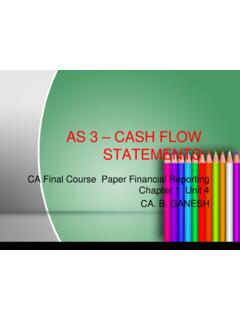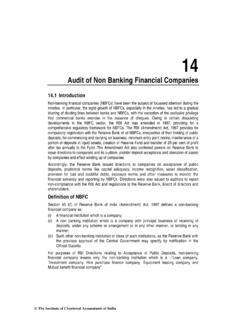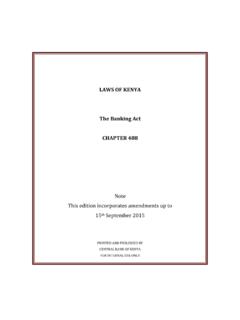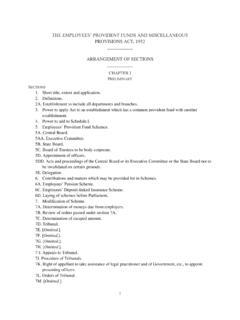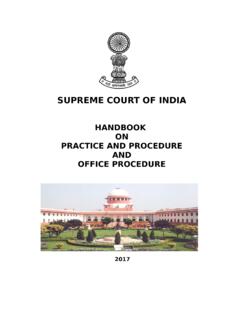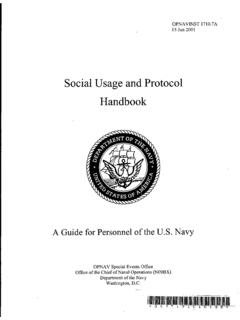Transcription of The Payment of Bonus Act, 1965 - ICAI Knowledge Gateway
1 3 The Payment of Bonus Act, 1965 Learning Objectives In this Chapter, the students will understand the- Applicability and non-applicability of the Act to certain classes of establishments and employees Computation of profits for the purpose of calculation of allocable and available surplus for the purpose of determination of Bonus Set on and Set off of allocable surplus Percentage limits for minimum and maximum Bonus Other miscellaneous provisions Introduction This is an Act intended to provide for the Payment of Bonus to persons employed in certain establishments on the basis of profits or on the basis of production or productivity and for matters connected therewith. It came into force from September 25, 1965. The Payment of Bonus Act, 1965 has undergone several amendments. This Act extends to the whole of India The Act is designed to: (i) impose a statutory obligation on an employer of every establishment covered by the Act to pay Bonus to employees in the establishment; (ii) lay down principle and formula for calculation of Bonus ; (iii) provide for Payment of minimum and maximum Bonus and linking the Payment of Bonus with the scheme of set-on and set-off; and (iv) provide machinery for e nforcement of liability for Payment of Bonus .
2 Applicability of the Act Unless it is provided otherwise in this Act, it shall apply to: (a) every factory; and (b) every other establishment in which 20 or more persons are employed on any day during an accounting year. The Institute of Chartered Accountants of Business Laws, Ethics and Communication (c) the appropriate Government may also apply the provisions of this Act with effect from such accounting year as may be notified in the official Gazette, to any establishment or class of establishments [including an establishment as defined by Section 2(m) (ii) of the Factories Act, 1948 ] employing persons less than 20 but not less than 10 in number [Proviso to Section 1(3)]. (d) The provision of this Act shall also apply to certain public sector establishments [Section 20(1)]. An establishment in which 20 or more persons are employed on any day during an accounting year, must continue to be governed by this Act, inspite of the fact that the number of persons employed therein falls below 20 [Section 1(5)].
3 A part-time employee is also an employee for the purpose of calculating the number of employees , 20 or more under Section 1(3)(b).[ Automobile Karamchari Sangh Vs. Industrial Tribunal, (1976) 38 FLR 268(All)] Act not to apply to certain classes of Employees (Section 32) The following are the categories of employees who are excluded from the operation of the Act: (i) Employees employed by the Life Insurance Corporation of India; (ii) Seamen as defined under Section 3(42) of the Merchant Shipping Act, 1958; (iii) Employees registered or listed under any scheme made under the Dock Workers (Regulation of Employment) Act, 1948 and employed by registered or listed employers; (iv) Employees employed by an establishment engaged in any industry carried on by or under the authority of any department of the Central Government or a State Government or a local authority; (v) Employees employed by- (a ) the Indian Red Cross Society or any other institution of a like nature (including its branches).
4 (b) Universities and other educational Institutions; (c) Institutions (including hospitals, chambers of commerce and social welfare institutions) established not for purposes of profit; (vi) Employees employed by the Reserve Bank of India; (vii) Employees employed by the financial and other institutions such as; (a) the Industrial Finance Corporation of India; (b) any Financial Corporation established under Section 3, or any Joint Financial Corporation established under Section 3A, of the State Financial Corporations Act, 1951; (c) the Deposit Insurance Corporation; (d) the National Bank for Agriculture and Rural Development ; The Institute of Chartered Accountants of India The Payment of Bonus Act, 1965 (e) the Unit Trust of India; (f) the Industrial Development Bank of India; (g) the Small Industries Development Bank of India established under Section 3 of the Small Industries Development Bank of India Act,1989; (h) the National Housing Bank ; (i) any other financial institution (other than a banking company) being an establishment in public sector, which the Central Government may, by notification in the Official Gazette, specify; while so specifying the Central Government shall have regard to its capital structure, its objectives and the nature of its activities and the nature and extent of financial assistance or any concession given to it by the Government and any other relevant factor; (viii) Employees employed by inland water transport establishment operating on routes passing through any other country.
5 Application of the Act to establishments in Public Sector in certain cases [Section 20] In following two conditions, this Act will be applied on the public sector establishments(PSEs)- (i) If in any accounting year an establishment in public sector sells any goods produced or manufactured by it or renders any services ,in competition with an establishment in p rivate sector, and (ii) The income from such sale or services or both is not less than twenty percent of the gross income of the establishment in public sector for that year, then, the provisions of this Act shall apply in relation to such establishment in public sector as they apply in relation to a like establishment in private sector[ Sub-section(1)]. Save as otherwise provided in Sub-section (1), nothing in this Act shall apply to the employees employed by any establishment in the public sector [Sub-section (2)].
6 Definitions: (Section 2) Accounting year [Section 2(1)]: It means, (i) in relation to a corporation, the year ending on the day on which the books and accounts of the corporation are to be closed and balanced; (ii) in relation to a company, the period in respect of which any profit and loss account of the company laid before it in annual general meeting is made up, whether that period is a year or not; (iii) in any other case- (a) the year commencing on the first day of April; or (b) if the accounts of an establishment maintained by the employer thereof are closed and balanced on any day other than the 31st day of March, then, at the option of the employer, the year ending on the day on which its accounts are so closed and balanced. The Institute of Chartered Accountants of Business Laws, Ethics and Communication Provided that an option once exercised by the employer under clause (iii)(b) shall not again be exercised except with the previous permission of the prescribed authority in writing and on such terms as the authority may think to impose.
7 Allocable surplus [Section 2(4)]: Allocable surplus means: (i) In case where company is employer- Where a company (other than a banking company) which has not made the arrangements prescribed under the Income-tax Act, 1961 for the declaration and Payment within India of the dividends payable out of its profits in accordance with the provisions of Section 194 of that Act- there 67% of the allocable surplus in an accounting year shall be the allocable surplus, (ii) In any other case of employer- the allocable surplus means 60% of such available surplus. Appropriate Government [Section 2(5)] : In relation to an establishment in respect of which the appropriate Government under the Industrial Disputes Act, 1947 is the Central Government, the Appropriate Government means the Central Government. But in relation to any other establishment, the expression means the Government of the State in which the other establishment is situated.
8 Available Surplus [Section 2(6)]: It means the available surplus in an accounting year as defined and computed under Section 5 of the Act. Available surplus shall be the gross profit for that year after deduction of prior charges(mentioned in Section 6) and by addition of the amount equal to the difference of certain items(mentioned in section 7). Therefore, available surplus can be calculated with the following equation: Gross profit for the purpose of Bonus Amount of prior charges + amount equal to the differences between the amount of direct taxes on the gross profit [for the immediately preceding accounting year and of the immediate preceding accounting year after deduction of the amount of Bonus which the employer has paid/liable to pay for that year( as calculated in accordance with the provisons od section 7 )] = available surplus.
9 Award [Section 2(7)]: It means an interim or a final determination of any industrial dispute or of any question relating thereto by any Labour Court, Industrial Tribunal, or National Tribunal constituted under the Industrial Disputes Act, 1947, or by any other authority constituted under any corresponding law, relating to investigation and settlement of industrial disputes in force in a state and includes an arbitration award made under Section 10A of that Act or under that law. Employee [Section 2(13)] : It means any person (other than an apprentice) employed (i) O n a salary or wage not exceeding ` 10,000 per mensem in any industry, (ii) T o do any skilled or unskilled, manual, supervisory, managerial, administrative, technical or clerical work, (iii) for hire or reward, (iv) Under the express /implied terms of employment The Institute of Chartered Accountants of India The Payment of Bonus Act, 1965 Employer [Section 2(14)].
10 Includes- (1) In relation to an establishment which is a factory the owner or occupier of the factory, including the agent of such owner or such occupier, the legal representative of a deceased owner or occupier and where a person has been named as a manager of that factory under Section 7(1)(f) of the Factories Act, 1948, the person so named are termed as employer. (2) In relation to any other establishment which is not a factory the person or the authority which, has the ultimate control over the affairs of the establishment and if the said affairs are entrusted to a manager, managing director, or managing agent then such manager, managing director or managing agent are termed as employer. Establishment in private sector [Section 2(15)]: This expression means any establishment other than an establishment in public Sector.


